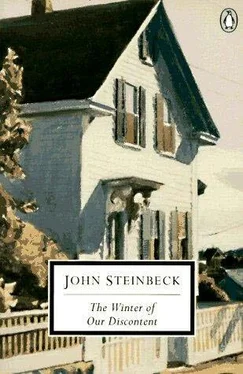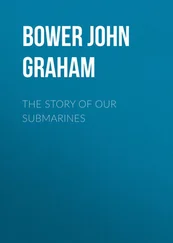“But that’s different.”
“Of course it is, darling. Nearly everything’s different. Can you disbelieve in something you don’t know about?”
“Look out for him,” Mary said. “He’ll catch you in a word trap.”
“I will not. I don’t know about fortunes or fortune-telling. How can I not believe in it? I believe it exists because it happens.”
“But you don’t believe it’s true.”
“What’s true is that people get it done, millions of them, and pay for it. That’s enough to know to be interested, isn’t it?”
“But you don’t—”
“Wait! It isn’t that I don’t believe but that I don’t know. They’re not the same thing. I don’t know which comes first—the fortune or the fortune-telling.”
“I think I know what he means.”
“You do?” Mary was not pleased.
“Suppose the fortune-teller was sensitive to things that are going to happen anyway. Is that what you mean?”
“That’s different. But how can cards know?”
I said, “The cards can’t even move without someone turning them.”
Margie did not look at me but I knew she sensed Mary’s growing unease and she wanted instructions.
“Couldn’t we work out a test?” I asked.
“Well, that’s a funny thing. These things seem to resent a test and go away, but there’s no harm trying. Can you think of a test?”
“You haven’t touched your rum.” They lifted their glasses together and sipped and put them down. I finished mine and got out the bottle.
“Ethan, do you think you should?”
“Yes, dearling.” I filled my glass. “Why can’t you turn the cards blindfolded?”
“They have to be read.”
“How would it be if Mary turned them or I did, and you read them?”
“There’s supposed to be a closeness between the reader and the cards, but I don’t know—we could try.”
Mary said, “I think if we do it at all, we ought to do it the right way.” She’s always that way. She doesn’t like change—little change, I mean. The big ones she can handle better than anyone, blows up at a cut finger but would be calm and efficient with a cut throat. I had a throb of unease because I had told Mary we discussed this, and here we were seeming to think of it for the first time.
“We talked about it this morning.”
“Yes, when I came in for coffee. I’ve been thinking about it all day. I brought the cards.”
It is Mary’s tendency to confuse intentness with anger and anger with violence and she is terrified of violence. Some drinking uncles put that fear on her, and it’s a shame. I could feel her fear rising.
“Let’s not fool with it,” I said. “Let’s play some cassino instead.”
Margie saw the tactic, knew it, had probably used it. “All right with me.”
“My fortune’s set. I’m going to be rich. Let it go at that.”
“You see, I told you he didn’t believe in it. He leads you all around the bush and then he won’t play. He makes me so mad sometimes.”
“I do? You never show it. You are always my darling wife.”
Isn’t it strange how sometimes you can feel currents and cross-currents—not always, but sometimes. Mary doesn’t use her mind for organized thought and maybe this makes her more receptive of impressions. A tension was growing in the room. It crossed my mind that she might not be best friends with Margie any more—might never feel easy with her.
“I’d really like to know about the cards,” I said. “I’m ignorant. I always heard that gypsies do it. Are you a gypsy? I don’t think I ever knew one.”
Mary said, “Her maiden name was Russian but she’s from Alaska.”
Then that accounted for the wide cheekbones.
Margie said, “I have a guilty secret I’ve never told you, Mary, how we came to be in Alaska.”
“The Russians owned it,” I said. “We bought it from them.”
“Yes, but did you know it was a prison, like Siberia, only for worse crimes?”
“What kind of crimes?”
“The worst. My great-grandmother was sentenced to Alaska for witchcraft.”
“What did she do?”
“She raised storms.”
I laughed. “I see you come by it naturally.”
“Raising storms?”
“Reading cards—same thing, maybe.”
Mary said, “You’re joking. That isn’t true.”
“It may be joking, Mary, but it’s true. That was the worst crime, worse than murder. I’ve still got her papers—only of course they’re in Russian.”
“Can you speak Russian?”
“Only a little now.”
I said, “Maybe witchcraft still is the worst crime.”
“See what I mean?” said Mary. “He jumps this side and that side. You never know what he’s thinking. Last night he—he got up before daylight this morning. Went for a walk.”
“I’m a scoundrel,” I said. “An unmitigated, unredeemable rascal.”
“Well, I would like to see Margie turn the cards—but her own way without you mixing in. If we keep talking, the children will be home and then we can’t.”
“Excuse me a moment,” I said. I climbed the stairs to our bedroom. The sword was on the bed and the hatbox open on the floor. I went to the bathroom and flushed the toilet. You can hear the water rushing all over the house. I wet a cloth in cold water and pressed it against my forehead and particularly against my eyes. They seemed to bulge from inside pressure. The cold water felt good. I sat on the toilet seat and put my face down against the damp washcloth and when it warmed up I wet it again. Going through the bedroom, I picked the plumed Knight Templar’s hat from its box and marched down the stairs wearing it.
“Oh, you fool,” said Mary. And she looked glad and relieved. The ache went out of the air.
“Can they bleach ostrich feathers?” I asked. “It’s turned yellow.”
“I think so. Ask Mr. Schultz.”
“I’ll take it down Monday.”
“I wish Margie would turn the cards,” said Mary. “I would dearly love that.”
I put the hat on the newel post of the banister, and it looked like a drunken admiral if there is such a thing.
“Get the card table, Eth. It takes lots of room.”
I brought it from the hall closet and snapped the legs open.
“Margie likes a straight chair.”
I set a dining chair. “Do we have to do anything?”
“Concentrate,” said Margie.
“On what?”
“As near as possible on nothing. The cards are in my purse over on the couch.”
I’d always thought of fortune-telling cards as greasy and thick and bent, but these were clean and shining, as though they were coated with plastic. They were longer and narrower than playing cards and many more than fifty-two. Margie sat straight at the table and fanned them—bright-colored pictures and intricate suits. The names were in French: l’empereur, l’ermite, le chariot, la justice, le mat, le diable —earth, sun, moon, and stars, and suits of swords, cups, batons, and money, I guess, if deniero means money, but the symbol was shaped like a heraldic rose, and each suit with its roi, reine, and chevalier. Then I saw strange cards—disturbing cards—a tower riven by lightning, a wheel of fortune, a man hanging by his feet from a gallows, called le pendu, and Death— la mort, [27] l’empereur, l’ermite, le chariot, la justice, le mat, le diable… le pendu… la mort: Tarot cards, used for divination: “It’s how they fall in relation…”: The emperor (wisdom and authority to achieve goals), the hermit (mysteries of inner life), the chariot (focus energy), justice (balance scales to serve the greater good), the fool (trust your instincts), the devil (empower your passionate nature), the hanged man (one of the most complex cards in the deck, suggesting life’s paradoxes), death (shed old identities to express new ones).
a skeleton with a scythe.
Читать дальше











